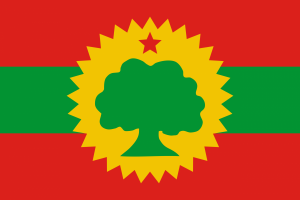Language/Borana-arsi-guji-oromo/Grammar/Past-Tense
| ◀️ Present Tense — Previous Lesson | Next Lesson — Family Members ▶️ |
Forming and Using the Past Tense in Borana-Arsi-Guji Oromo
Congratulations! You're now entering the next stage of your Borana-Arsi-Guji Oromo language learning journey. This lesson will teach you all you need to know about forming the past tense of regular verbs and using them properly.
Regular Verbs in the Past Tense
Firstly, let's review what regular verbs are. In Borana-Arsi-Guji Oromo, regular verbs are those that don't undergo any changes when being conjugated into different tenses or when being used for different subjects. In this way, regular verbs form their simple past tense by adding the suffix -in to the verb stem.
For example:
| Borana-Arsi-Guji Oromo | Pronunciation | English |
|---|---|---|
| namii | /na-mi:/ | ran |
| namiisin | /na-mi:sɪn/ | ran (past tense) |
The verb stem namii means "to run." To express its past tense, the suffix -in is added to the end of the verb stem, forming namiisin, which now means "ran."
It's important to note that the suffix -in changes spelling to -iin when the verb stem ends with a vowel. For example:
| Borana-Arsi-Guji Oromo | Pronunciation | English |
|---|---|---|
| garaa | /ga-ra:/ | answer |
| garaajiin | /ga-ra:dʒɪ:n/ | answered (past tense) |
The verb stem garaa means "to answer." Since it ends with a vowel, the suffix -in changes to -iin, forming garaajiin, which now means "answered."
Using the Past Tense in Sentences
Now that you've learned how to form the past tense of regular verbs in Borana-Arsi-Guji Oromo, it's time to discuss how to use it correctly in sentences. In the Borana-Arsi-Guji Oromo language, verbs often come at the beginning of the sentence, followed by the subject and then the object.
Here's an example sentence:
Namiisin argee fiqir - I ran for love.
The subject I is followed by the past tense of the verb "to run" (namiisin) and then the object for love (argee fiqir).
Another example:
Garaajin walitti burasa bane - He answered the student's question correctly.
The subject he is followed by the past tense of the verb "to answer" (garaajin) and then the object the student's question (walitti burasa) and the adverb correctly (bane).
Irregular Verbs in the Past Tense
Unlike regular verbs, irregular verbs don't form their past tense by simply adding a suffix. In Borana-Arsi-Guji Oromo, there are several irregular verbs that need to be memorized and conjugated accordingly. Here is a list of some common irregular verbs and their past tense forms:
| Borana-Arsi-Guji Oromo | Pronunciation | English | |||
|---|---|---|---|---|---|
| irraa | /ir-ra:/ | come | irrijees | /ir-ridʒɛːs/ | came (past tense) |
| ittiqa | /ɪt-tɪ-qa/ | cough | ittiqakis | /ɪt-tɪ-qakɪs/ | coughed (past tense) |
| teenyaa | /teː-nja:/ | write | teenyaajees | /teː-nja:dʒɛːs/ | wrote (past tense) |
As you can see in the table above, the past tense forms of some irregular verbs change the verb stem and involve different suffixes instead of -in.
Practice Sentences
The more you practice, the better you'll get at forming and using the past tense in Borana-Arsi-Guji Oromo. Here are some practice sentences for you to try:
- Anaa ajooftuuti kanaa ilaalchise ni baasuu gaanfateef qabachu, hundi kamiinuu jiru - Yesterday, after I showed that important document to my boss, he gave me a promotion.
- Oromoon dhisiisaa wayya ilyaamiin gari ababbaan hin jirre namaa defatee jettee - Many Oromo people used to use the ilyaam plough in the past to farm the land.
- Jiraatanii barreessu adabaa fi seena qorannoo fi loon ibidda qooqachuuf kan didee - Those who lived through wars and political crises in the past still remember the suffering and torture they faced.
Good job! By now, you should be able to form and use the past tense of regular and irregular verbs in Borana-Arsi-Guji Oromo with confidence. Don't forget to keep practicing and using this tense in everyday conversations!
Other Lessons
- Give your Opinion
- Future Tense
- Conditional Mood
- Basic Sentence Structure
- Questions
- Singular and Plural Nouns
- Plurals
- 0 to A1 Course
- Negation
- Present Tense
Template:Borana-arsi-guji-oromo-Page-Bottom
| ◀️ Present Tense — Previous Lesson | Next Lesson — Family Members ▶️ |

